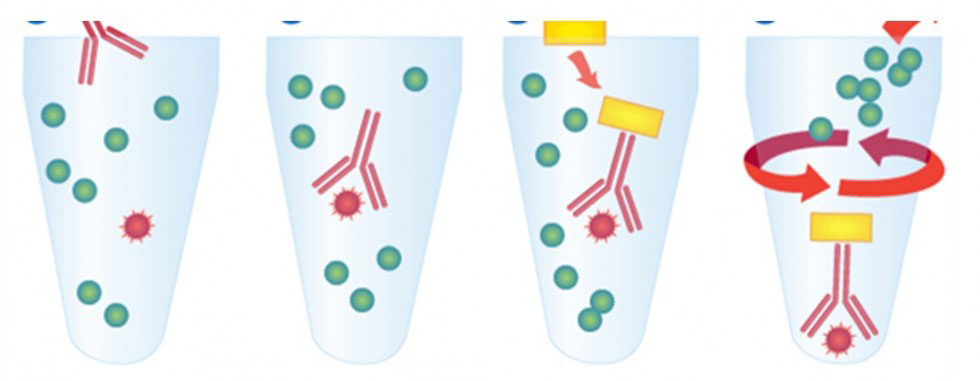
Immunoprecipitation (IP) Service
Description
Immunoprecipitation (IP) is a technique that uses antibodies specific to a protein to selectively remove those proteins from a complex mixture, such as a cell lysate. This process can be used to isolate and concentrate a particular protein from a sample containing many thousands of different proteins. Immunoprecipitation of intact protein complexes is known as co-immunoprecipitation (Co-IP). Co-IP works by selecting an antibody that targets a known protein believed to be a member of a larger complex of proteins. By targeting this known member with an antibody it may be possible to pull the entire protein complex out of the solution and thereby identify unknown members of the complex. This works when the proteins involved in the complex bind to each other tightly, making it possible to pull multiple members of the complex out of solution by latching onto one member with an antibody. This concept of pulling protein complexes out of solution is sometimes referred to as a “Pull-Down” procedure. Co-IP is a powerful technique that is used routinely by molecular biologists to analyze protein-protein interactions.
Chromatin Immunoprecipitation (ChIP) assays areanother immunoprecipitation technique used to investigate the interaction between proteins and DNA in the cell. It aims to determine whether specific proteins are associated with specific genomic regions, such as transcription factors on promoters or other DNA binding sites, and possibly defining cistromes. ChIP assays also aim to determine the specific location in the genome that various histone modifications are associated with, indicating the target of the histone modifiers. RNA immunoprecipitation (RIP) is similar to chromatin immunoprecipitation (ChIP), but rather than targeting DNA binding proteins, RNA immunoprecipitation targets RNA binding proteins. RIP is also an in vivo method in which live cells are exposed to formaldehyde in order to create cross-links between RNA and RNA-binding proteins. Cells are then lysed and the immunoprecipitation is performed with an antibody that targets the protein of interest. By isolating the protein, the RNA will also be isolated, because they are cross-linked. The purified RNA-protein complexes can be separated by reversing the cross-link and the identity of the RNA can be determined by cDNA sequencing or RT-PCR.
Immunoprecipitation process

1. After some time, the antibody is allowed to bind to protein of interest.
2. Protein A/G is added to render the protein- antibody complex insoluble.
3. Centrifugation of the sample is performed, and removal of the supernatant allows the protein of interest to be obtained.
Applications
Immunoprecipitation can be used for many purposes. Among these are:
1. Determination of the molecular weight and isoelectric point of immunoprecipitated proteins by one-dimensional or two-dimensional SDS-PAGE.
2. Verification an antigen of interest is synthesized by a specific tissue (i.e., a radiolabeled protein can be identified in tissues or cells cultured with radiolabeled precursors).
3. Determination of whether a protein contains carbohydrate residues by evaluating whether immunoprecipitated antigen from cells cultured with radioactive monosaccharides is radiolabeled.
4. Characterization of the type of carbohydrate present on glycoproteins – evaluate incorporation of different radiolabeled monosaccharides into immunoprecipitated proteins during cell culture and test whether inhibitors of glycosylation alter the molecular weight of the immunoprecipitated protein.
5. Determination of precursor-product relationships by performing pulse-chase labeling, followed by immunoprecipitation. Quantification of the synthesis rates of proteins in culture by determining the quantity of immunoprecipitated, radiolabeled protein.
Our Our Immunoprecipitation Service
KareBay™ Biochem is prepared to supply our customers with the professional technical immunoprecipitation services relevant to immunoprecipitation. We can setup a preliminary experiment to explore the optimal sample volume and optimal antibody dilution according to the specific circumstances of the customer’s sample.
How to get started
Please contact us with your Immunoprecipitation (IP) Service requests at service@karebaybio.com and we will reply with a detailed quote as soon as possible. This process usually takes between 24 and 48 hours and the quote will include an estimated price as well as the time required to complete the project. All inquiries and subsequent projects are handled in strict confidence and will be backed by a confidentiality agreement if desired.






